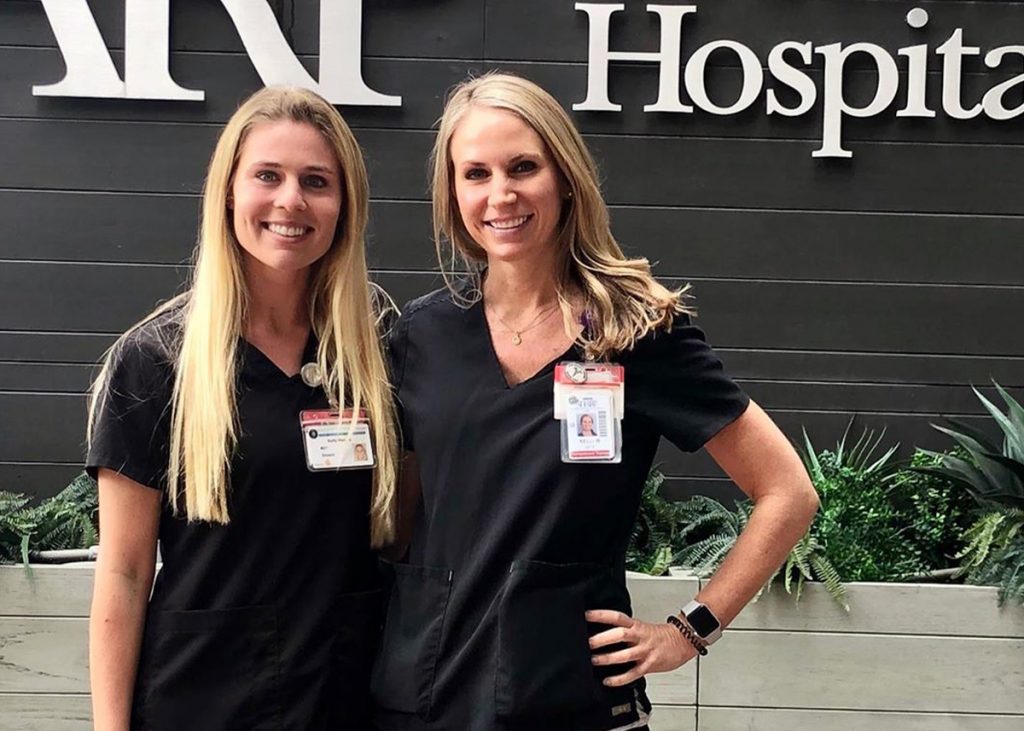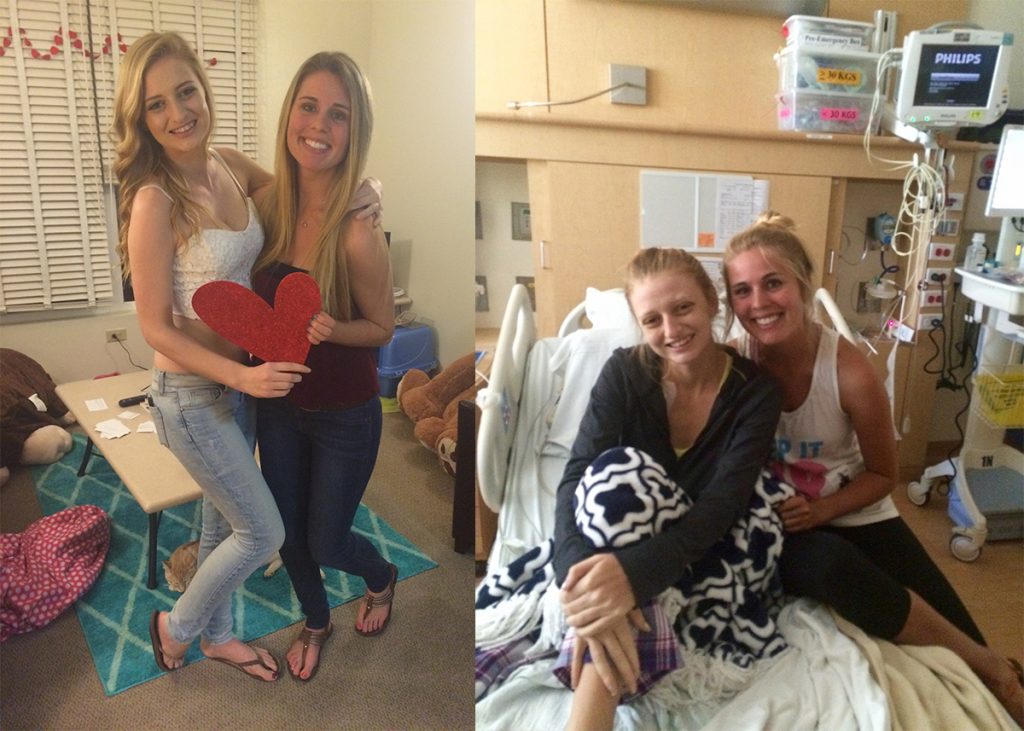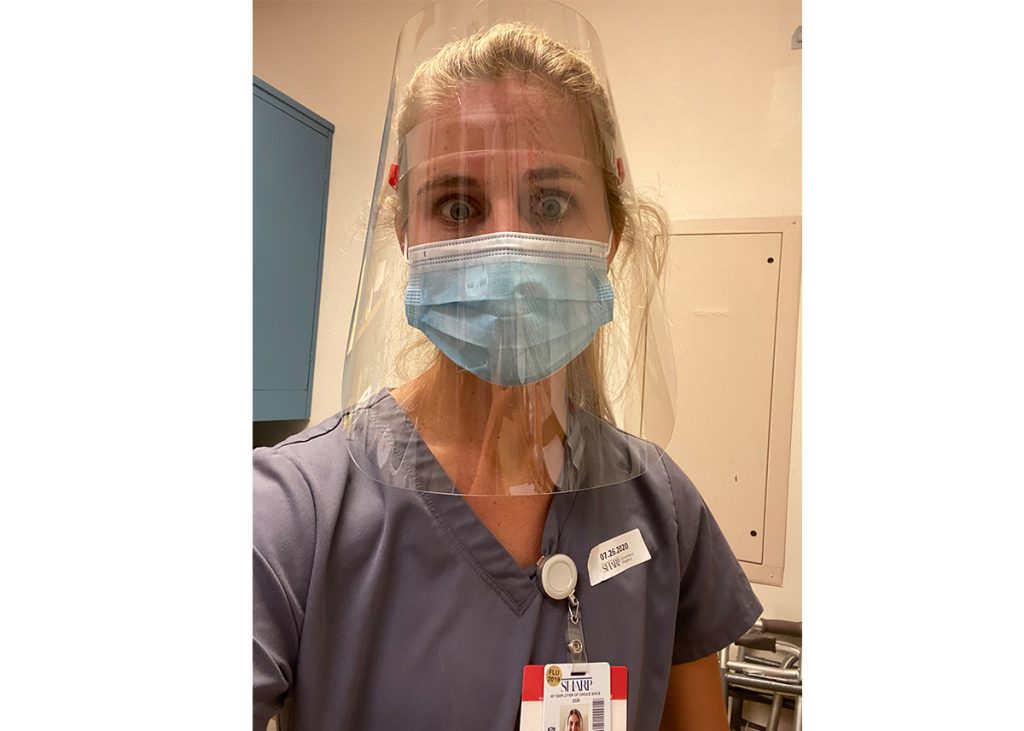
How an Occupational Therapist Supports Cancer Survivors
An Interview with Kelly Watson
Meet Kelly Watson. Kelly was Kirsten’s best friend since first grade and was a loyal supporter throughout Kirsten’s journey. Kelly continues to be an amazing supporter for the young adult cancer community as a founding board member of the b-present Foundation and engaged volunteer supporting the b-present programs and events. Kelly recently completed her degree in Occupational Therapy, and now supports patients in need as a registered and licensed occupational therapist (OTR/L).

Kirsten Westerman (left) and Kelly Watson (right)
If you are like me, you may not know about the important role the Occupational Therapist plays in the rehabilitation of a cancer survivor. I sat down with Kelly to set the record straight on what an Occupational Therapist does, and the important role OTs play in supporting cancer survivors, helping them get back to living their fullest life.
Abby: Hey Kelly! Thanks for chatting with me. Before we talk about your current occupation, would you mind sharing a little about your friendship with Kirsten, the inspiration behind b-present?
Kelly: Absolutely! My friendship with Kirsten began in first grade when she and her family had moved to San Diego. We were both shy little children but immediately hit it off. Kirsten and I had continued to have a strong, sister-type friendship ever since. I will always cherish the friendship we had and the memories we made. Kirsten was truly an amazing person and possessed great qualities that we have tried to translate into the inspiration behind b-present.

Kirsten Westerman (left) and Kelly Watson (right)
Abby: As a supporter of a young adult cancer patient, what is something you have learned that you wish you knew when you were first called on for support?
Kelly: I wish I would have known how to be a better supporter in general, honestly. Even though Kirsten was my best friend for such a long period of time, I often found myself not knowing what to say, how to act, or even how I should entertain her during our visits. Thankfully, b-present has provided several resources for concerns very similar to mine and given me and others advice and tips on how to address these concerns while being a supporter.
Abby: What inspired you to get an OT degree?
Kelly: I always knew that I wanted to help others and give back in some sort of way. I really fell in love with the idea of occupational therapy after learning what the career truly encompassed. With OT you get to help others restore their functioning of day to day activities (i.e. showering, getting dressed, going to the bathroom, etc.) that many of us participate in so instinctively and never realize we may need re-learning them after a traumatic injury, illness or disability. I love the holistic approach the career offers and being able to help others increase their quality of life through meaningful rehabilitation.

Abby: When I hear the title “occupational therapist”, I have always thought it was someone who helps a person that is injured on the job and needs to heal to get back to work. What exactly does an occupational therapist (OT) do?
Kelly: An occupational therapist is someone who works with various populations, in several settings, and essentially strives to promote an increased quality of life through rehabilitation. We thoroughly analyze an individual’s “occupations”, which you are not alone in thinking it only has something to do with someone’s job. Occupations are any activities of daily living that you enjoy doing day in and day out.
Abby: How would an OT specifically support young adult cancer survivors?
Kelly: With a cancer diagnosis, young adults will likely experience drastic changes and prevention of participating in their daily routines, roles, and activities. They may be facing several functional deficits including, but not limited to, fatigue, muscle weakness, cognition, and a decreased ability to perform daily tasks as independently as they once were. Mental health also plays a vital role in this diagnosis as young adults with cancer may have increased feelings of depression, isolation, anxiety, low self-esteem, and body image.
Abby: What are some of the different interventions provided by OT’s that help increase overall well-being and achieve maximal function.
Kelly: Patients that go through harsh rounds of chemotherapy and many other treatments may benefit from energy conservation training, activity modification, and the ability to monitor energy patterns. Moreover, OT interventions can assist with skills ranging from getting oneself dressed/undressed, taking a bath/shower, using the restroom, to the more complex activities such as organizing a daily schedule, paying bills, cooking, cleaning, taking care of children and/or aging family members, or pets. All of these are very important
Abby: Once you assess the patient’s needs, how do you help them get back to life?
Kelly: Adaptive strategies are designed and used to best suit that patient and help them compensate for any impaired function whether it is physical, mental, or cognitively. Additionally, OT’s are fully equipped to provide exercise programs that include exercises, stretching, massage, and other modalities to help improve muscle strength, range of motion, and elasticity.
Abby: You and some of your peers started a website to help other new OT’s navigate the profession. What inspired you to start that website?
Kelly: We were inspired to do that to help other OT’s and OT students by sharing with them real, raw, and honest knowledge that we had wished we received during school/post-graduation. Our goal is to provide resources for these individuals that we think would be really helpful in transitioning from graduate school to landing that first job!
b-p: What is the most rewarding part of your job?
Kelly: The most rewarding part of my job is seeing my patients/clients happy with their successes. I love seeing them improve no matter how big or small it might be and that feeling of confidence and motivation they gain.
Abby: As a supporter of a young adult cancer patient, are there any lessons you have incorporated into your new profession as an occupational therapist and how you interact with patients?
Kelly: Yes! I have learned to treat each patient as an individual and understand that they have a life and are a person outside of their diagnosis or condition. I have learned to treat others with empathy, but also not pity them for the position they may be in. Instead, provide them with the most support and encouragement that I am able to.
Abby: Thanks so much for sharing your perspective Kelly, and for dedicating your career to helping others get back on their feet! Any final thoughts?
Kelly: I hope you found this quick glimpse into the life of an OT working with cancer patients interesting and informative! And that you may now recognize how this holistic rehabilitative discipline can assist individuals with a cancer diagnosis in achieving maximal functional performance (physically and mentally), independence, and increased quality of life.
Want more?
- Visit otunfiltered.com for more Occupational Therapist resources
- Read You Just Found Out Your Friend Has Cancer – Now What?
- Learn more about the b-present Foundation
